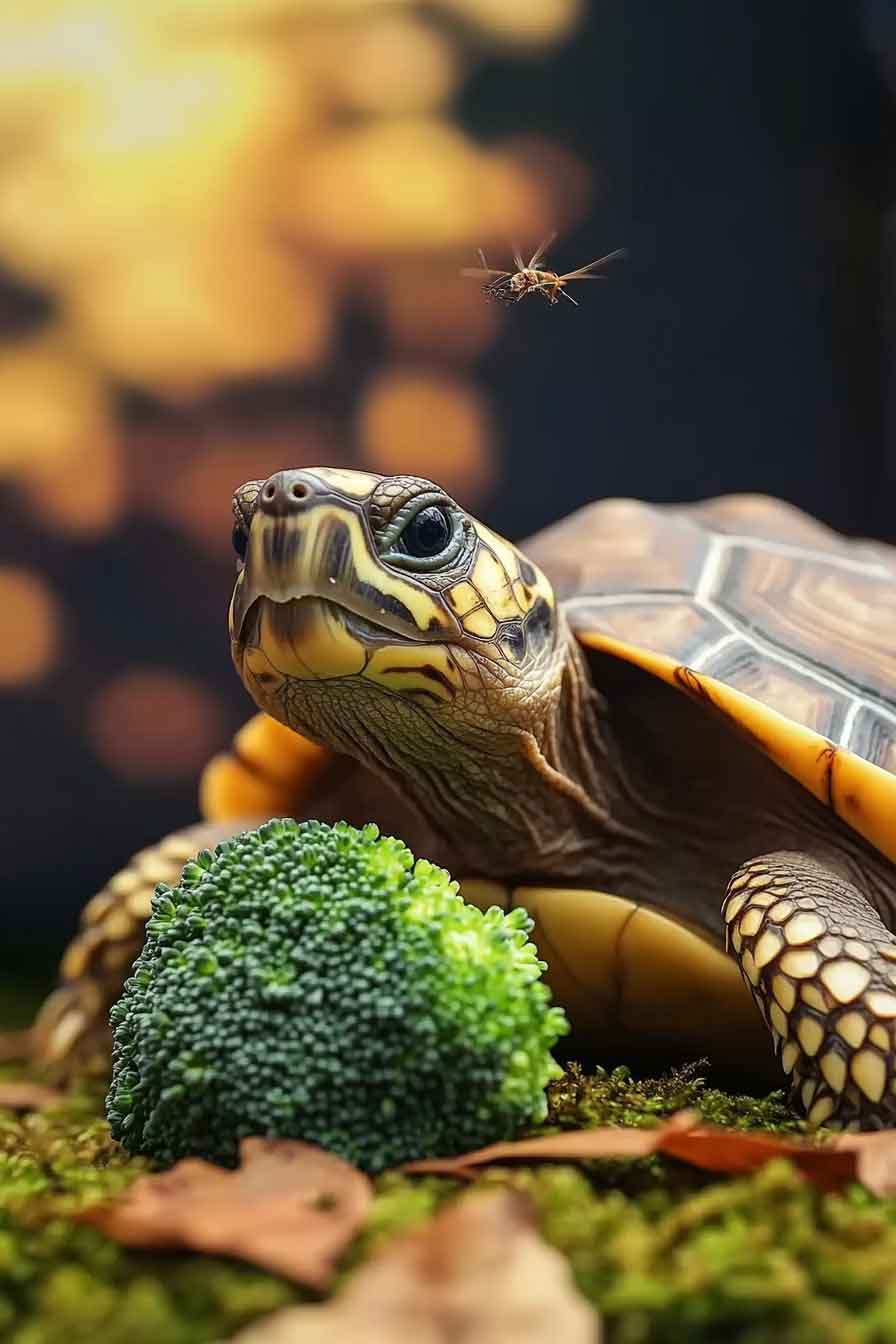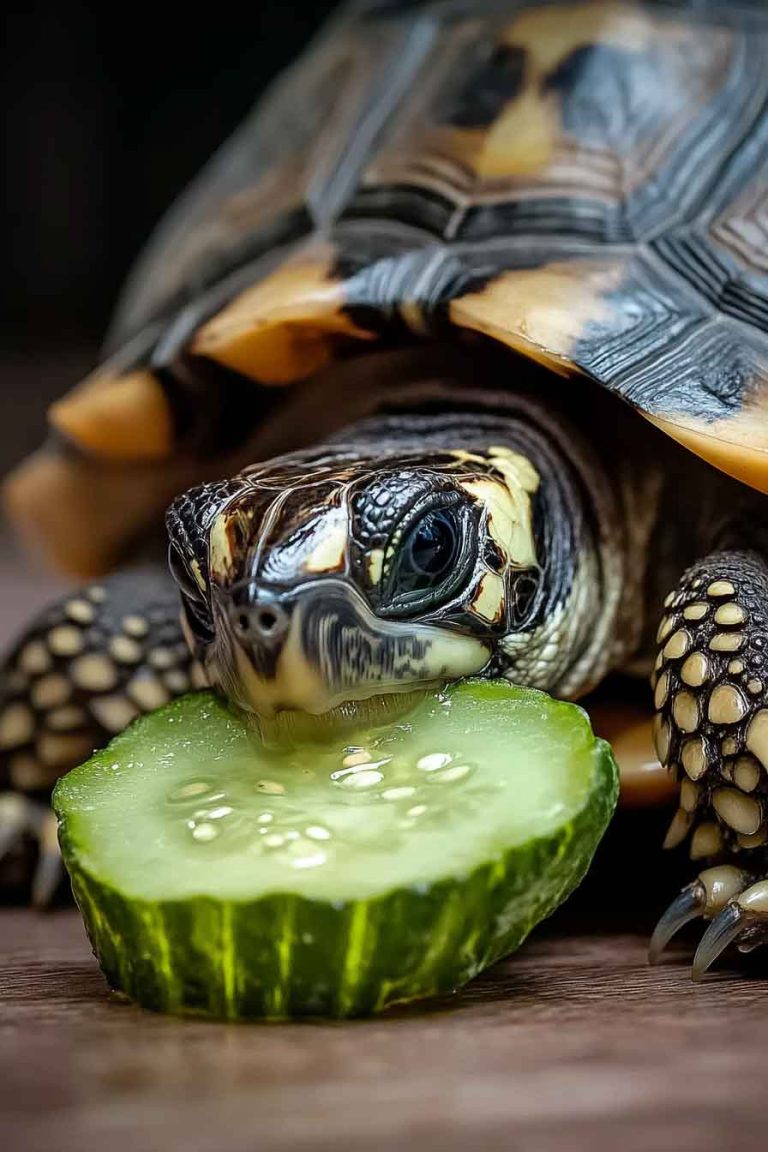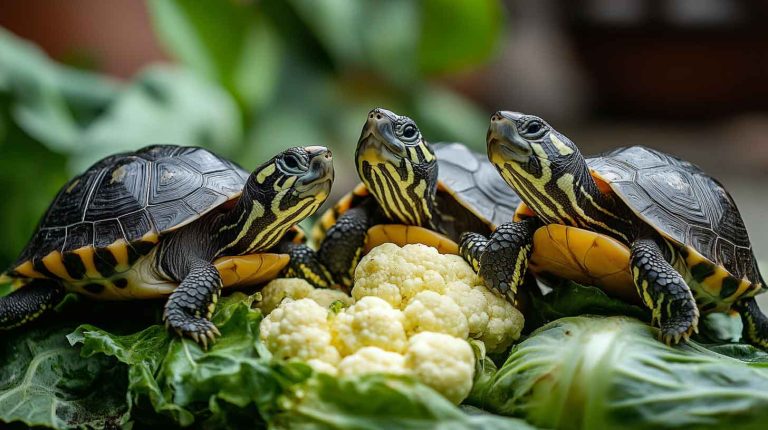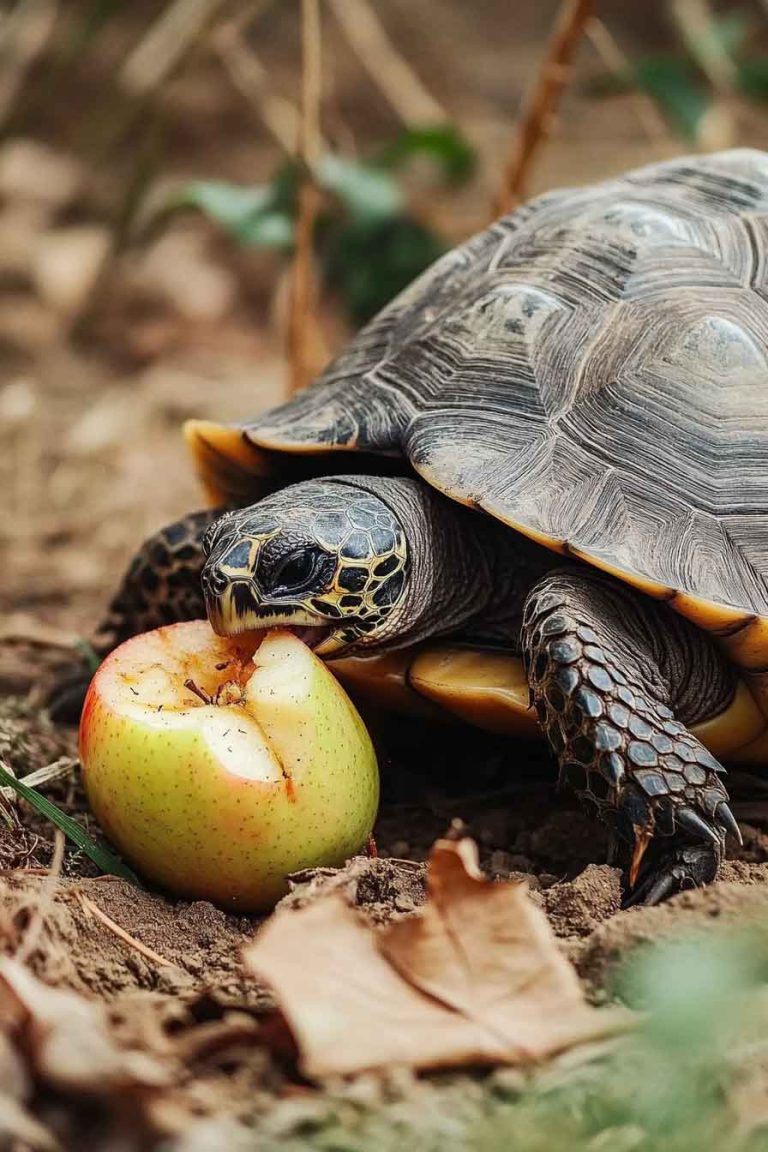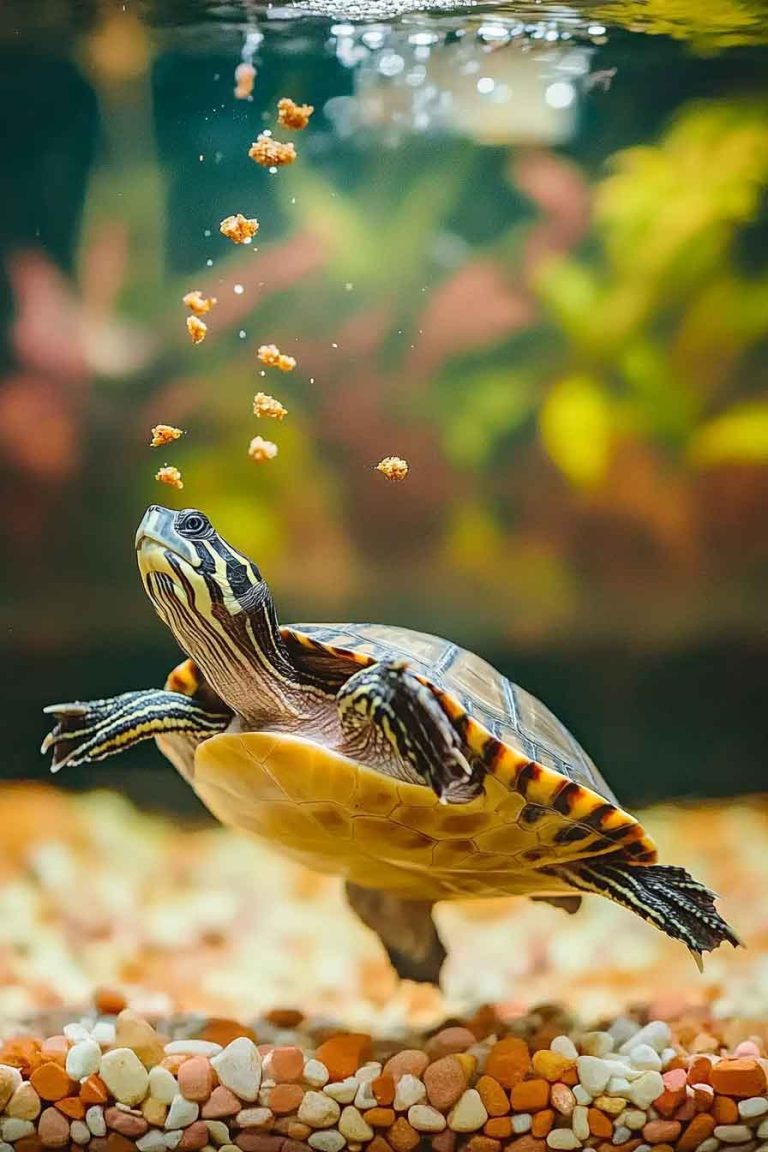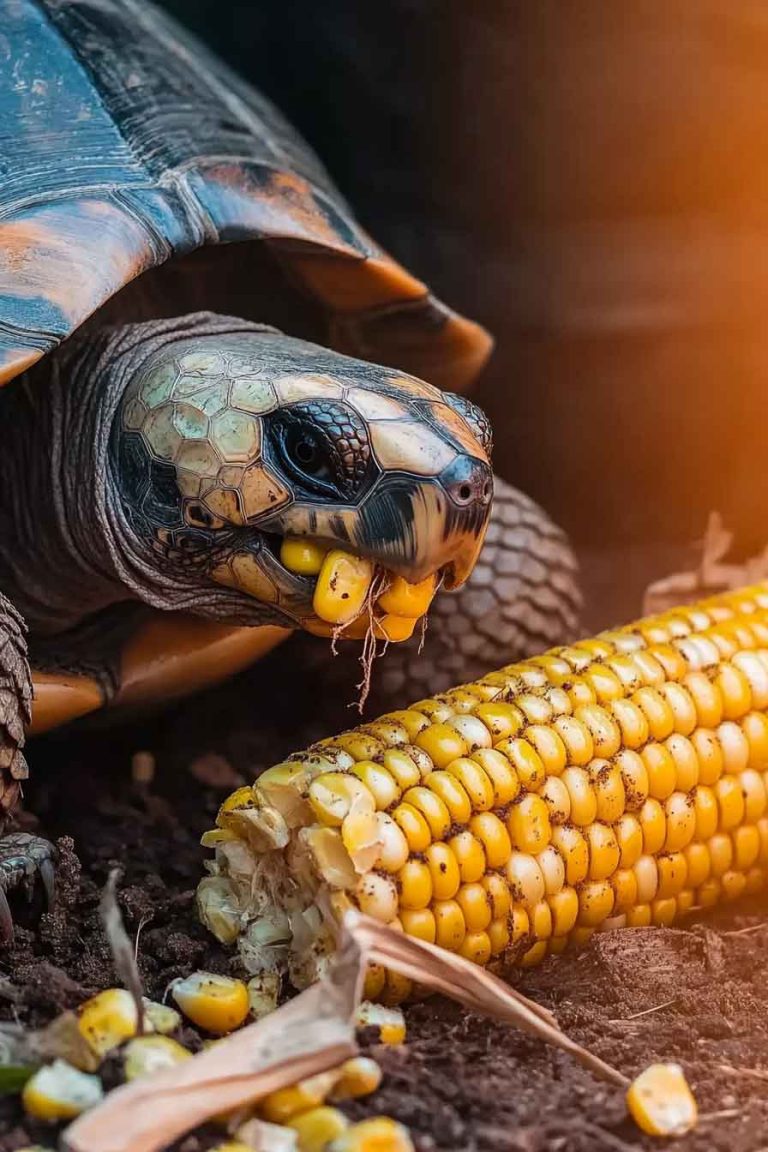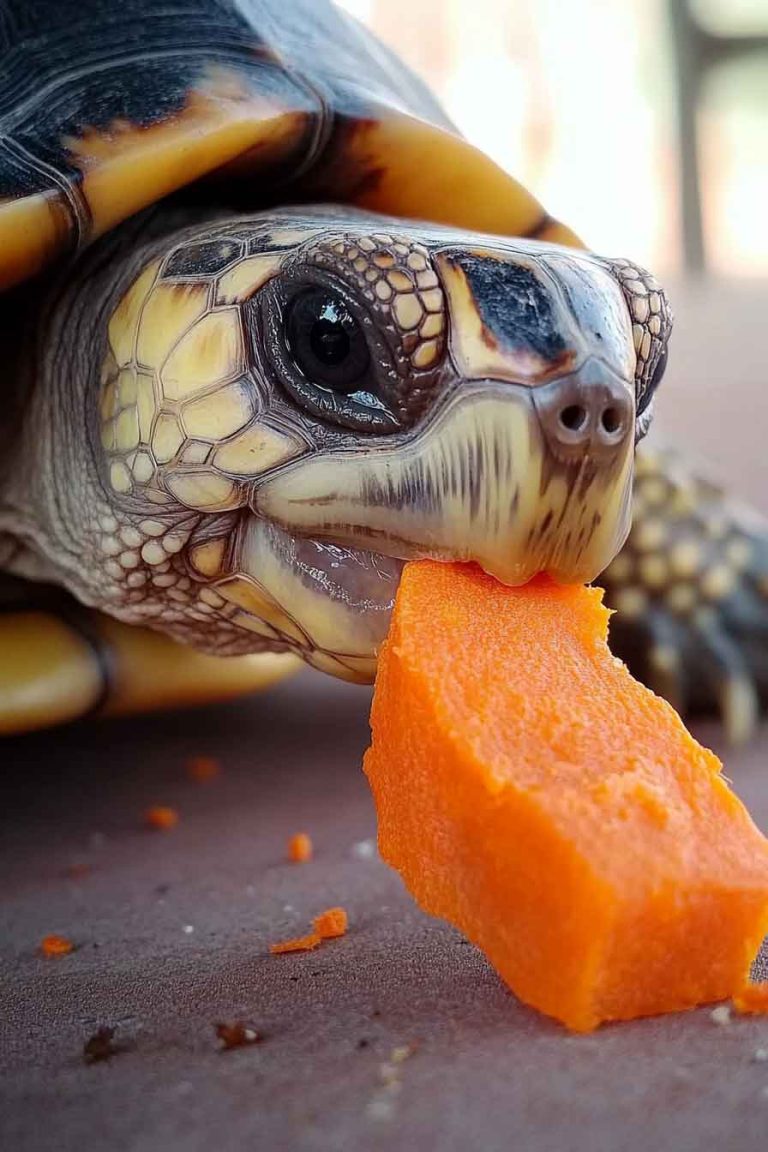Can Turtles Eat Broccoli? What Every Owner Should Know
If you’re a turtle owner like me, you’ve probably found yourself wondering about sharing your healthy vegetables with your shelled companion. I know I have! When I’m preparing a fresh broccoli dish, those curious little eyes watching from the terrarium make me wonder – can my turtle enjoy this nutritious green vegetable too? So, can…
If you’re a turtle owner like me, you’ve probably found yourself wondering about sharing your healthy vegetables with your shelled companion. I know I have! When I’m preparing a fresh broccoli dish, those curious little eyes watching from the terrarium make me wonder – can my turtle enjoy this nutritious green vegetable too?
So, can turtles eat broccoli? The answer is yes – turtles can eat broccoli, but with important considerations. Broccoli is safe for most turtle species when given in moderation. However, it should only be offered as an occasional treat, not a regular part of their diet. Fresh, properly prepared broccoli can provide valuable nutrients, but like many vegetables, it needs to be balanced with other foods.
In this comprehensive guide, I’m going to share everything you need to know about feeding broccoli to your turtle. From nutritional benefits to potential risks, proper preparation methods, and feeding guidelines – let’s dive into the complete picture.
Can You Feed Broccoli To Your Pet Turtle?
Yes, you can feed broccoli to your pet turtle! Unlike some vegetables that are completely off-limits to our reptilian friends, broccoli falls into the “safe but limited” category. As a turtle enthusiast who’s been caring for these amazing creatures for years, I’ve learned that broccoli can actually be a beneficial addition to a turtle’s diet when used correctly.
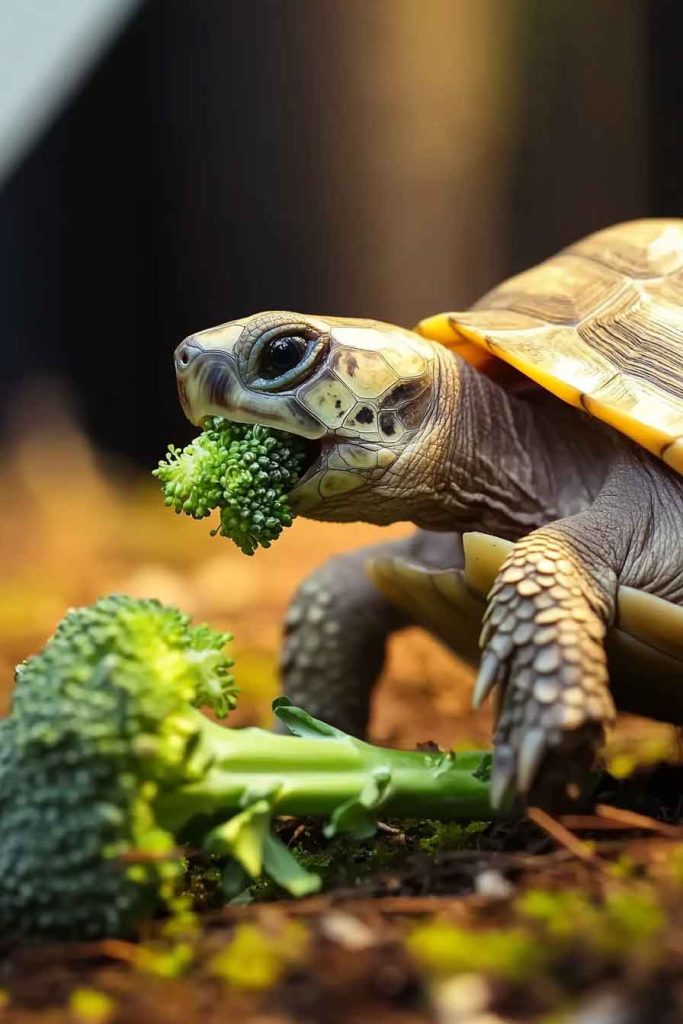
However, before you start tossing broccoli florets into your turtle’s habitat, there are several crucial factors you need to understand. Turtles have specific dietary requirements that differ significantly from ours, and what’s healthy for us isn’t always ideal for them.
Let me break down the nutritional profile of 100 grams of raw broccoli so you can understand exactly what your turtle would be consuming:
Nutritional Content of Broccoli (per 100g):
- Carbohydrates: 6.64 g
- Sugar: 1.55 g
- Protein: 2.82 g
- Calcium: 47 mg
- Phosphorus: 66 mg
- Vitamin C: 89.2 mg
- Vitamin K: 101.6 mcg
- Folate: 63 mcg
- Potassium: 316 mg
- Magnesium: 21 mg
- Iron: 0.73 mg
- Fiber: 2.6 g
Looking at this nutritional breakdown, you can see why broccoli has both benefits and concerns for turtles. The good news is that broccoli is relatively low in sugar compared to many other vegetables, which is excellent since turtles struggle to process high sugar content.
However, I notice that the calcium to phosphorus ratio is approximately 1:1.4, which isn’t ideal. Turtles require a 2:1 calcium to phosphorus ratio for optimal health. This doesn’t mean broccoli is dangerous, but it means we need to be mindful of how often we offer it and what other foods we’re providing to balance out the nutrients.
Do Turtles Like Broccoli?
In my experience, turtle preferences for broccoli vary significantly by individual and species. I’ve observed that some turtles absolutely love the texture and mild flavor of broccoli, while others show little interest. Most turtles that do enjoy broccoli seem to prefer the florets over the stems, though I’ve seen exceptions to this rule.
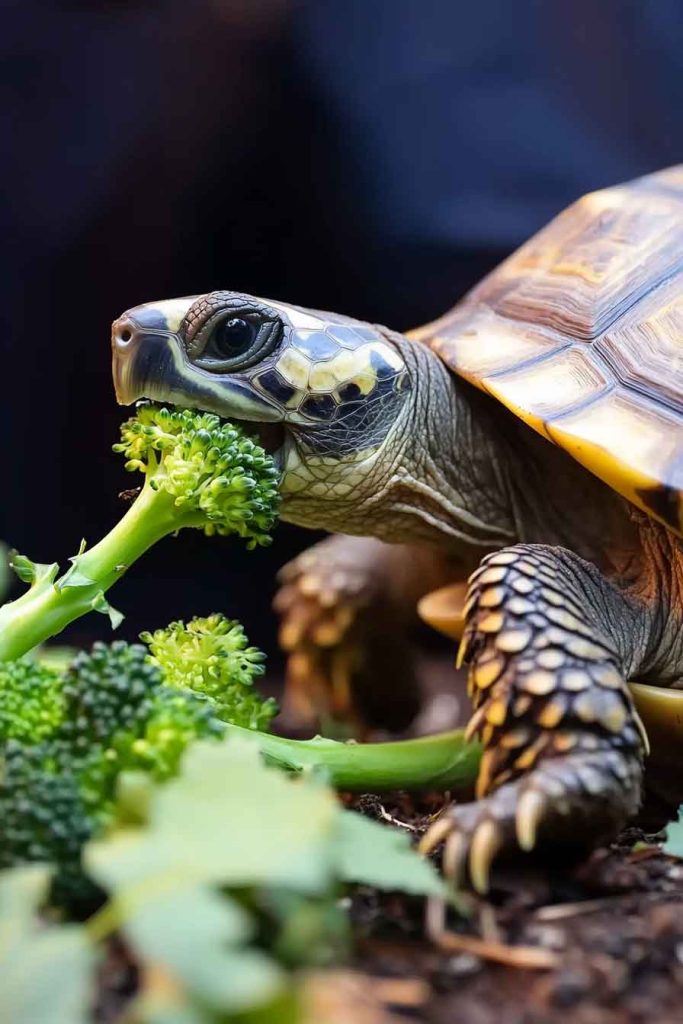
What I find fascinating is that many turtles are initially hesitant about new foods, including broccoli. If your turtle turns away from broccoli the first time you offer it, don’t give up! Sometimes it takes several attempts before they’ll even try a new food. I always recommend patience when introducing any new vegetable to your turtle’s diet.
The texture of broccoli seems to appeal to many turtles – it’s soft enough to bite through easily but still provides some satisfying crunch. The mild, slightly sweet flavor also tends to be more acceptable to turtles than stronger-tasting vegetables.
Health Benefits of Broccoli for Turtles
When fed appropriately, broccoli can offer several health benefits for your turtle. Let me walk you through the key advantages I’ve observed and researched:
Rich in Vitamin C
Broccoli is exceptionally high in vitamin C, which supports your turtle’s immune system. While turtles can synthesize some vitamin C on their own, additional sources can be beneficial, especially for turtles recovering from illness or stress.
Good Source of Vitamin K
The vitamin K content in broccoli supports proper blood clotting and bone metabolism. This is particularly important for growing turtles and those recovering from shell injuries.
Antioxidant Properties
Broccoli contains various antioxidants that can help protect your turtle’s cells from damage. These compounds support overall health and may contribute to longevity.
Fiber Content
The fiber in broccoli can aid in digestion when given in appropriate amounts. It helps maintain healthy gut function and can prevent constipation in some turtles.
Folate Support
The folate in broccoli supports cellular function and can be particularly beneficial for breeding females or growing juveniles.
Potential Health Risks of Feeding Broccoli to Turtles
While broccoli offers benefits, there are several risks you need to be aware of. I’ve learned through experience and research that even safe foods can cause problems when not handled properly.
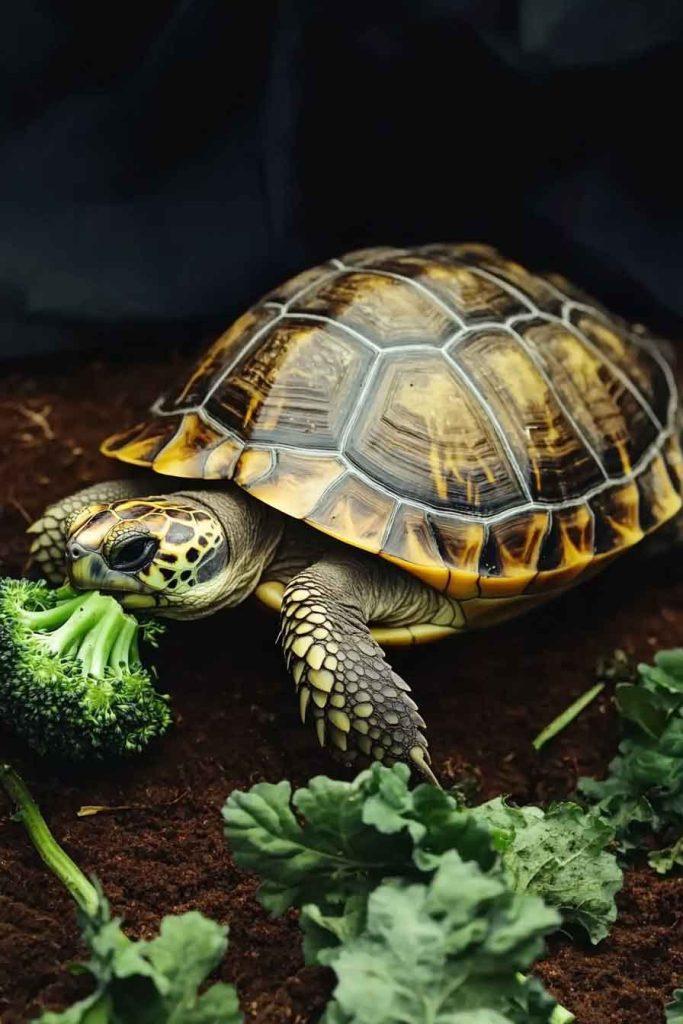
Calcium-Phosphorus Imbalance
The most significant concern with broccoli is its calcium to phosphorus ratio. As I mentioned earlier, broccoli contains more phosphorus than calcium, which can contribute to calcium deficiency if it becomes a regular part of your turtle’s diet.
When turtles don’t get enough calcium relative to phosphorus, they can develop Metabolic Bone Disease (MBD). I’ve seen the devastating effects of MBD in turtles – soft shells, deformed bones, weakness, and in severe cases, death. This is why I always stress moderation when it comes to any food that doesn’t have an ideal calcium-phosphorus ratio.
Goitrogenic Compounds
Broccoli belongs to the cruciferous vegetable family, which contains goitrogenic compounds. These substances can interfere with thyroid function when consumed in large quantities. While occasional small amounts shouldn’t cause problems, regular heavy feeding of broccoli could potentially impact your turtle’s thyroid health.
Digestive Upset
Some turtles may experience digestive issues when first introduced to broccoli or when given too much too quickly. I’ve observed symptoms like loose stools or reduced appetite in turtles that have been overfed broccoli.
Pesticide Concerns
If you’re not using organic broccoli, there’s always the risk of pesticide residue. Turtles are more sensitive to chemicals than we are, so I always recommend thoroughly washing any non-organic vegetables or, better yet, choosing organic options when possible.
How Much Broccoli Should Turtles Eat?
This is one of the most important questions I get from fellow turtle owners. The key with broccoli is moderation – it should never make up more than 5-10% of your turtle’s vegetable intake, and vegetables themselves should only comprise a portion of their overall diet (the exact percentage depends on your turtle’s species).
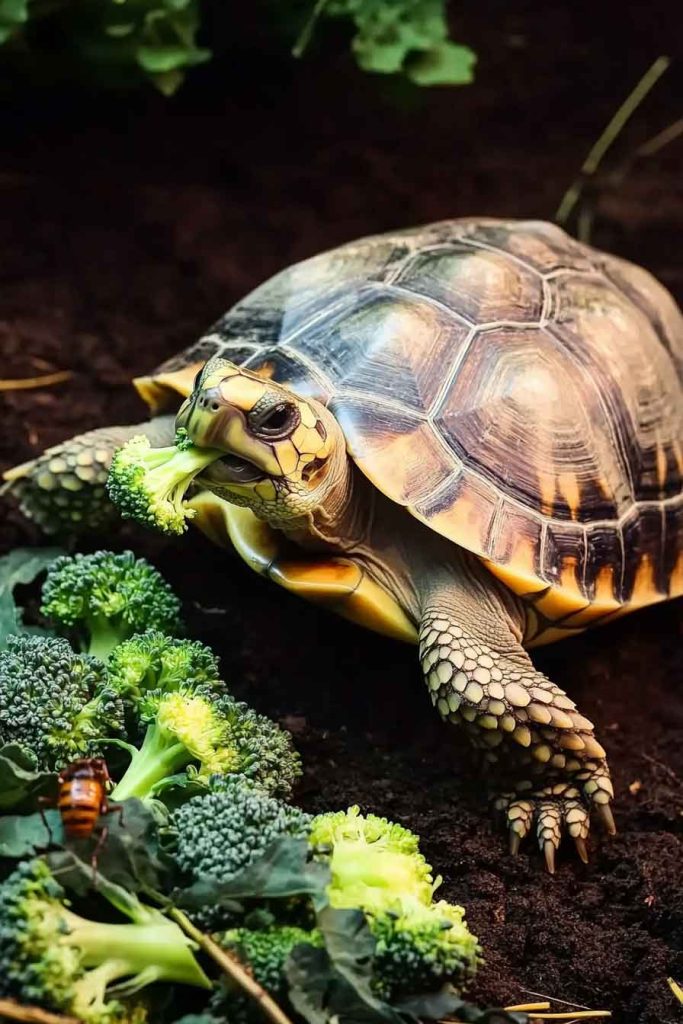
Here’s my general feeding guideline for broccoli:
For Adult Turtles:
- Offer broccoli no more than once or twice per week
- Provide pieces roughly the size of your turtle’s head
- Always mix with other vegetables, never serve broccoli alone
For Juvenile Turtles:
- Limit broccoli to once per week maximum
- Offer smaller portions than you would for adults
- Focus more on calcium-rich vegetables for growing turtles
For Baby Turtles:
- I generally recommend avoiding broccoli until they’re at least 6 months old
- Their developing digestive systems are more sensitive to nutritional imbalances
Remember, these are general guidelines. Your turtle’s specific species, size, health status, and individual preferences should all factor into your feeding decisions. When in doubt, consult with a reptile veterinarian who can provide personalized advice.
Can You Feed Broccoli to Baby Turtles?
I’m often asked about feeding broccoli to baby turtles, and my answer is always cautious. While broccoli isn’t toxic to baby turtles, I don’t recommend it as a regular part of their diet for several important reasons.
Baby turtles have rapidly growing bodies that require very specific nutrition. They need higher protein content than adults and an excellent calcium-phosphorus ratio to support proper shell and bone development. Since broccoli doesn’t provide the ideal calcium-phosphorus ratio, it’s not the best choice for these critical early months.
Additionally, baby turtles have smaller, more sensitive digestive systems. Foods that adult turtles handle easily can sometimes cause digestive upset in babies. I’ve found it’s better to stick with tried-and-true baby turtle foods during those crucial first months of life.
If you do want to introduce vegetables to a baby turtle’s diet, I recommend starting with options that have better calcium-phosphorus ratios, such as collard greens, dandelion greens, or mustard greens.
Proper Preparation of Broccoli for Turtles
How you prepare broccoli for your turtle is just as important as how much you give them. Here’s my step-by-step process for preparing broccoli safely:
Step 1: Choose Fresh, Quality Broccoli
Always select fresh broccoli with tight, green florets. Avoid any broccoli that’s yellowing, has brown spots, or smells off. Organic is preferable when possible to minimize pesticide exposure.
Step 2: Thorough Washing
Rinse the broccoli thoroughly under running water. I like to soak it for a few minutes to help remove any pesticide residues, then rinse again. Pay special attention to the florets where debris can hide.
Step 3: Decide on Raw vs. Cooked
Both raw and lightly steamed broccoli are acceptable for turtles. Raw broccoli retains more nutrients but can be harder for some turtles to digest. Lightly steamed broccoli is softer and may be easier on sensitive stomachs.
If you choose to steam the broccoli, do so very lightly – just until it’s slightly tender but still has some firmness. Over-cooking destroys nutrients and creates a mushy texture that many turtles don’t enjoy.
Step 4: Proper Sizing
Cut the broccoli into appropriate sizes for your turtle. The pieces should be small enough that your turtle won’t choke but large enough that they have to work a bit to eat them. Generally, pieces about the size of your turtle’s head work well.
Step 5: Remove from Heat Source
Never serve hot broccoli to your turtle. If you’ve steamed it, let it cool to room temperature first. Turtles can burn their mouths on hot food just like we can.
Step 6: Mix with Other Foods
I never serve broccoli by itself. Instead, I mix it with other turtle-safe vegetables to create a balanced meal. This helps ensure your turtle gets a variety of nutrients and doesn’t fill up on just one food type.
Best Vegetables to Pair with Broccoli
Since broccoli shouldn’t be served alone, let me share some excellent vegetable companions that create a more nutritionally balanced meal:
High-Calcium Options:
- Collard greens
- Dandelion greens
- Mustard greens
- Turnip greens
- Bok choy
These calcium-rich vegetables help balance out the phosphorus content in broccoli and provide the calcium your turtle needs for strong shells and bones.
Colorful Additions:
- Red bell peppers (remove seeds)
- Carrots (in small amounts)
- Yellow squash
- Sweet potato (occasionally)
These add variety in color, texture, and nutrients while keeping the meal interesting for your turtle.
Safe Leafy Greens:
- Romaine lettuce (not iceberg)
- Green leaf lettuce
- Endive
- Escarole
These provide additional bulk and hydration to the meal without adding problematic nutrients.
Frequently Asked Questions About Turtles and Broccoli
Can Box Turtles Eat Broccoli?
Yes, box turtles can eat broccoli following the same guidelines I’ve outlined above. Box turtles are omnivores with fairly adaptable digestive systems, but they still need moderation with broccoli due to the calcium-phosphorus ratio concerns.
Can Red-Eared Slider Turtles Eat Broccoli?
Red-eared sliders can indeed eat broccoli, but again, moderation is key. These semi-aquatic turtles have slightly different nutritional needs than terrestrial species, but the same principles apply regarding the calcium-phosphorus balance and portion control.
Can Painted Turtles Eat Broccoli?
Painted turtles can safely consume small amounts of broccoli occasionally. Like other aquatic species, they benefit from variety in their diet, and broccoli can be part of that variety when properly balanced with other foods.
Can Russian Tortoises Eat Broccoli?
Russian tortoises can eat broccoli, but I’m particularly cautious with this species. They’re more prone to digestive sensitivities than some other tortoise species, so I recommend starting with very small amounts and watching for any adverse reactions.
Should I Feed Broccoli Stems or Just Florets?
Both broccoli stems and florets are safe for turtles. The stems are actually higher in fiber and some nutrients than the florets. Many turtles enjoy the different textures, so I often include both. Just make sure to cut the stems into appropriate sizes.
Can Turtles Eat Frozen Broccoli?
Fresh broccoli is always preferable, but properly thawed frozen broccoli can work in a pinch. Never give your turtle frozen broccoli directly – always thaw it completely and bring it to room temperature first. Be aware that frozen vegetables often have a softer texture than fresh ones.
Signs Your Turtle May Not Tolerate Broccoli Well
Every turtle is an individual, and some may not handle broccoli as well as others. Here are warning signs I watch for that indicate a turtle might not be tolerating broccoli well:
Digestive Issues:
- Loose or unusually soft stools
- Changes in stool color or smell
- Reduced appetite after eating broccoli
- Signs of stomach discomfort (lethargy, unusual positioning)
Behavioral Changes:
- Refusing to eat broccoli after initially accepting it
- Appearing sluggish after broccoli meals
- Changes in normal activity patterns
Physical Symptoms:
- Any changes in shell quality over time
- Unusual weight loss or gain
- Changes in skin or eye appearance
If you notice any of these signs, I recommend removing broccoli from your turtle’s diet and consulting with a reptile veterinarian if symptoms persist.
Alternative Healthy Vegetables for Turtles
If your turtle doesn’t tolerate broccoli well or you’re looking for other nutritious options, here are some excellent alternatives I regularly recommend:
Excellent Daily Options:
- Collard greens
- Dandelion greens
- Mustard greens
- Turnip greens
Great Weekly Options:
- Squash varieties
- Bell peppers
- Green beans
- Endive
Occasional Treats:
- Carrots
- Sweet potato
- Peas (remove from pods)
- Cucumber
My Personal Experience with Turtles and Broccoli
In my years of turtle keeping, I’ve found that most turtles can enjoy broccoli as part of a varied diet. My red-eared slider, Max, absolutely loves broccoli florets and gets excited whenever he sees me preparing them. However, my box turtle, Shelly, was initially hesitant and only started enjoying broccoli after several attempts.
The key lesson I’ve learned is that patience and moderation are essential. I never force a turtle to eat something they’re refusing, and I always maintain variety in their diets. Broccoli has become a welcome addition to meal rotations, but it’s never the star of the show.
I’ve also learned the importance of observing each turtle individually. What works wonderfully for one turtle might not be suitable for another, even of the same species. This is why I always recommend starting slowly with any new food and monitoring your turtle’s response carefully.
Conclusion
Broccoli can be a healthy, nutritious addition to your turtle’s diet when used appropriately. The key points to remember are moderation, proper preparation, and individual monitoring. While broccoli offers valuable nutrients like vitamin C, vitamin K, and antioxidants, it should never become a dietary staple due to its calcium-phosphorus ratio.
As a responsible turtle owner, your job is to provide a varied, balanced diet that meets your turtle’s specific needs. Broccoli can certainly be part of that equation, but it’s just one piece of the puzzle. Always prioritize foods with excellent calcium-phosphorus ratios, maintain variety, and never hesitate to consult with a reptile veterinarian if you have concerns about your turtle’s diet or health.
Remember, every turtle is unique, and what works for my turtles might need adjustments for yours. Start slowly, observe carefully, and enjoy watching your turtle explore new flavors and textures. After all, mealtime should be an enriching experience for both you and your shelled companion!

